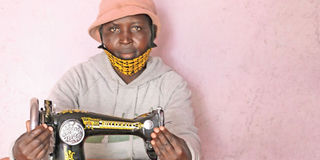Premium
My story: I am not limited despite being epileptic

Harriet Nyokabi, a tailor living with epilepsy in Nairobi’s Githurai 45 estate
What you need to know:
- Friends shunned her, the community branded her, and schools refused her admission.
- Today, she is a dressmaker with a dream to own a design house.
Harriet Nyokabi, 25, life reflects the reality of deep-rooted challenges most epilepsy victims face in Kenya, but that hasn't deterred her from pursuing her dreams. At the age of four, an accident left her not only with epileptic seizures but partially paralysed. Despite the everyday challenges she will not play the self-pity card. She narrates her story.
"I wake up every morning happy, despite being aware that I could experience an epileptic seizure. After my medication, I make my way to my tailoring shop based in Githurai 45 estate. I am optimistic about making some money each day. I am also hopeful of acquiring more skills in dressmaking and eventually coming up with my designs.
My tailoring business kicked off after graduating from a local vocational training centre, at which time I also juggled as a fruit hawker. I believe it is my dedication that won me the sewing machine that has anchored my current tailoring business.
I am 25, a mother of two and I have had epileptic seizures since I was four. This condition has not only seen me lose friends but also denied me a chance for a good education, as I was forced to drop out of school at a very early age.
My problem started after being knocked down by a car. The incident saw me spend more than three months in the intensive care unit ICU ward, but eventually, I won the battle and survived.
However, I wouldn't remain the same, as the accident not only left me with a permanent scar on my face but also, this was the beginning of my battle with this neurological condition.
As soon as I came home, the epileptic seizures began almost immediately.
My health condition hasn't deterred me from pursuing my dreams and putting in a spirited fight, in my quest to make my life better.
In my dressmaking training, I was named as one of the best, resilient and dedicated students, and this made me the first beneficiary of a brand new sewing machine from the training project.
But before officially settling into this business, I used to hawk fruits within the estate.
Every day, I traversed through Githurai 45, going door to door carrying two buckets of transparent plastic buckets filled with sliced watermelons and pineapples. It is a journey that took me to a daily trek of more than 20 kilometers, bracing the scorching sun and dust.
My customers used to be mostly business people and locals. From the money, I made I was able to chip into the family budget in and assist my husband who works in a quarry.
Though I am a fighter, I have to strictly adhere to my prescription to prevent the seizures. I take up to seven anti-epileptic tablets, daily.
The seizures were a blow to my education as I was forced to drop out in class four. I used to experience so many fits, and this didn't bode well not just with my fellow pupils, but also with some quite uncomfortable teachers. Since then, no learning institution would admit me.
Another problem has been that I am at risk of attack when I get seizures at isolated places. So far I have experienced rape ordeals, after I suffered seizures. One rape incident left me for dead, and the people who found me thought I was dead, and took me to a mortuary. I then woke up in the mortuary, and that’s how I was transferred to a hospital. The incidences left me traumatised.
Today, I have learnt to take one day at a time and I am confident one day I will expand my dressmaking business.
I take my life as perfectly normal, albeit with some challenges like any other person.
I would like my life to be a be an inspiration not just to people like me, but also everyone else out there who sees whatever condition they have, as a limitation to achieving their goals in life. I want people to see themselves beyond whatever impediment they have."
About Epilepsy
Epilepsy is a central nervous system (neurological) disorder in which brain activity becomes abnormal, causing seizures or periods of unusual behaviour, sensations, and sometimes loss of awareness. Anyone can develop epilepsy. The condition affects 65 million people around the world.
According to the National Epilepsy Coordination Committee, in Kenya nearly one million people live with the condition, with two in every 100 epileptic victims not accessing medical care due to lack of knowledge about the disease.
According to experts, 70 per cent of people living with epilepsy have a bigger chance to recover from the disease and live a normal life. However, others have to use medication for a lifetime.
There are several reasons you might have a seizure. These include:
- High fever
- Head trauma
- Very low blood sugar
- Alcohol withdrawal
How to deal with seizures
It is important to learn first aid when one is experiencing seizures. One of them is to give the victim enough space and ensure there is no object around that could cause harm, ensuring the person is relaxed. The victim’s head should also be on one side to prevent choking, especially if there is foam being released through the mouth. If the convulsions last long, the victim should be rushed to the hospital.





